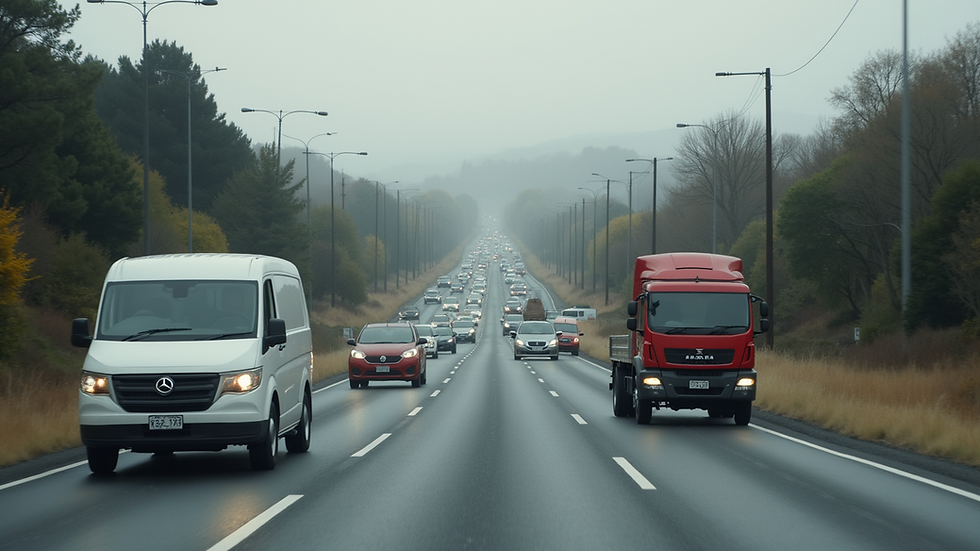The Impact of Road User Charges for Petrol Vehicles in New Zealand
- Jesmond John Micallef
- Aug 16, 2025
- 4 min read
Updated: Sep 30, 2025
The introduction of road user charges for petrol vehicles in New Zealand is sparking significant discussion among policymakers, environmentalists, and everyday citizens. With increasing concerns over climate change and growing urban congestion, these charges aim to inspire a shift towards more sustainable transport options. However, implementing such a policy is complex and requires careful examination.
Understanding Road User Charges
Road user charges (RUC) are fees that vehicles pay to utilize public roads. Originally, these charges applied only to heavy vehicles. A recent proposal suggests extending them to petrol vehicles. This shift in New Zealand's transport policy seeks to lower greenhouse gas emissions while promoting the use of electric and hybrid vehicles.
The objective is clear, but challenges remain. For instance, a significant concern is how these charges will be calculated. If the charges are based on distance driven, how will this data be collected and verified? Furthermore, will these charges disproportionately impact low-income families who depend on petrol vehicles for commuting? A family in a rural area may not have easy access to public transport or charging stations, making them more vulnerable to increased costs.
The Environmental Perspective
From an environmental viewpoint, introducing road user charges for petrol vehicles aligns with New Zealand's goal of cutting carbon emissions. The transport sector contributes about 17% of the country’s total greenhouse gas emissions. Transitioning to cleaner alternatives is essential for meeting climate targets set in the Paris Agreement.
However, critics argue that merely imposing charges may not spur significant change. A 2021 survey indicated that over 60% of New Zealanders expressed a desire for improved public transport before charging initiatives are enforced. Without adequate investments in public transport infrastructure and a sufficient network of electric vehicle (EV) charging stations, many drivers may feel trapped in their petrol vehicles. The government must ensure that transitioning to greener options is practical and accessible for all New Zealanders.
Economic Implications
The economic effects of road user charges present a complex picture. On one hand, these charges could generate significant revenue for public transport and infrastructure improvements. Estimates suggest that extending RUCs to petrol vehicles could raise over NZD 150 million annually. On the other hand, these charges could impose an extra financial burden on low-income households.
For many Kiwis, particularly those in rural locations, petrol vehicles are a necessity, not merely a choice. The introduction of road user charges could lead to increased commuting costs. A family commuting 30 kilometers daily may find their monthly transportation costs rise by up to 15%. Policymakers must factor in these economic realities when shaping the structure of road user charges.
Public Sentiment and Acceptance
Public acceptance of road user charges is fundamental to their effectiveness. While many New Zealanders support environmental initiatives, there can also be resistance to policies perceived as punitive or unfair. Surveys show that 55% of participants would prefer options other than direct charges to encourage cleaner transport.
Clear communication regarding the benefits of road user charges is vital. The government should explain how this revenue will be reinvested into areas such as public transport and road safety improvements. Engaging communities will also be crucial to address any concerns around fairness. If petrol vehicles are seen as being unfairly targeted, there may be public pushback that could hinder compliance.

Exploring Alternatives to Road User Charges
While road user charges might be one way to tackle the environmental impact of petrol vehicles, exploring other solutions is equally important. For example, investing in public transport can significantly reduce the number of petrol vehicles on the roads. A study revealed that adding a single bus route could reduce local car traffic by up to 12%.
Additionally, encouraging the adoption of electric vehicles through subsidies or tax breaks could promote a faster transition to sustainable transport. In 2022, when subsidies were offered, the sales of electric vehicles surged by 22%. By diversifying strategies, the government could formulate a more comprehensive approach to reducing transport-related emissions.
The Role of Technology in Sustainable Transport
Technology plays a crucial role in the future of sustainable transport. Innovations in electric vehicle technology, battery efficiency, and renewable energy sources can significantly impact the transport sector. For instance, advancements in battery technology are making electric vehicles more accessible and affordable.
Moreover, smart transportation systems can optimize traffic flow and reduce congestion. These systems use real-time data to manage traffic signals and public transport schedules. By integrating technology into transport planning, New Zealand can enhance its sustainability efforts.
Final Thoughts on Road User Charges
The introduction of road user charges for petrol vehicles in New Zealand presents both prospective benefits and challenges. Achieving the goal of reducing greenhouse gas emissions is admirable, but how these charges are implemented will determine their overall success.
Policymakers need to focus on transparency, public engagement, and equitable solutions. This way, the transition to a more sustainable transport system can be both just and efficient. As New Zealand confronts this pivotal moment, it is essential to view road user charges not just as a financial tool, but as part of a broader strategy for a greener future.




Comments